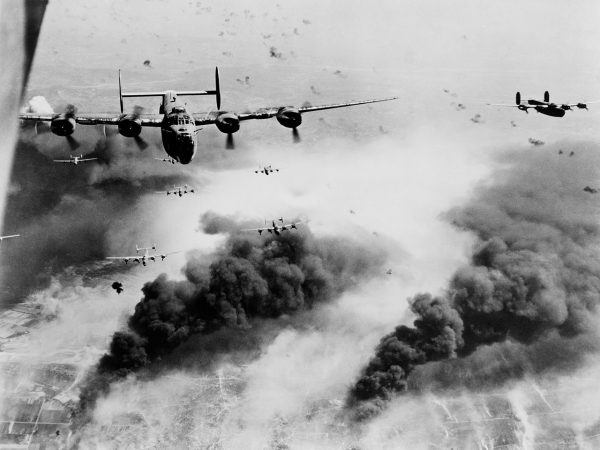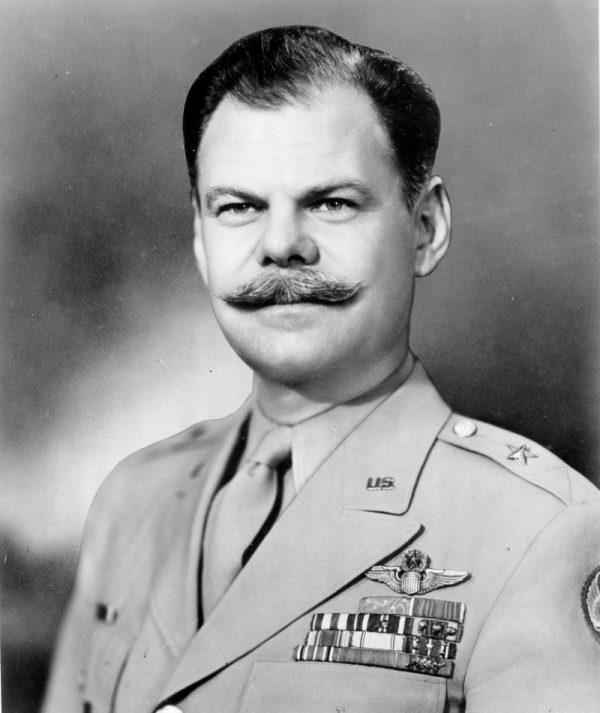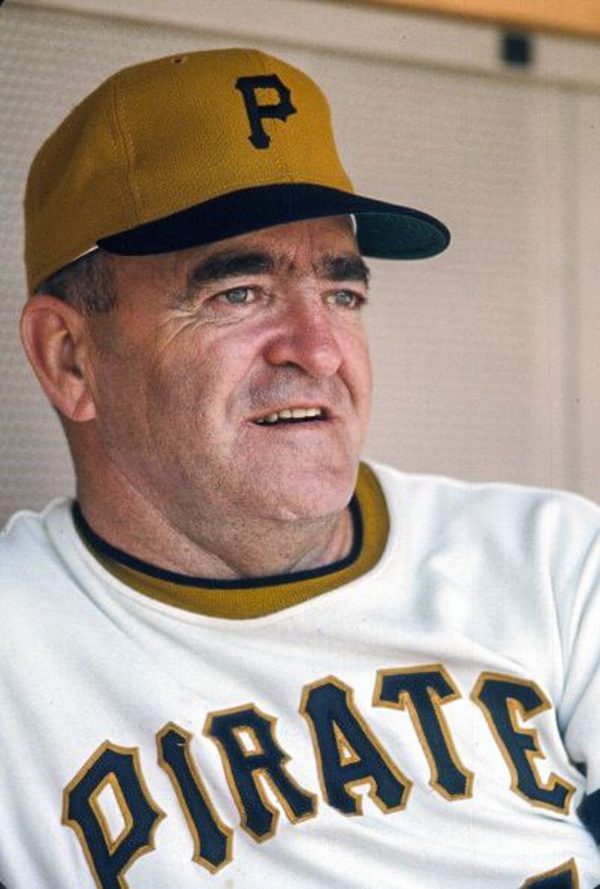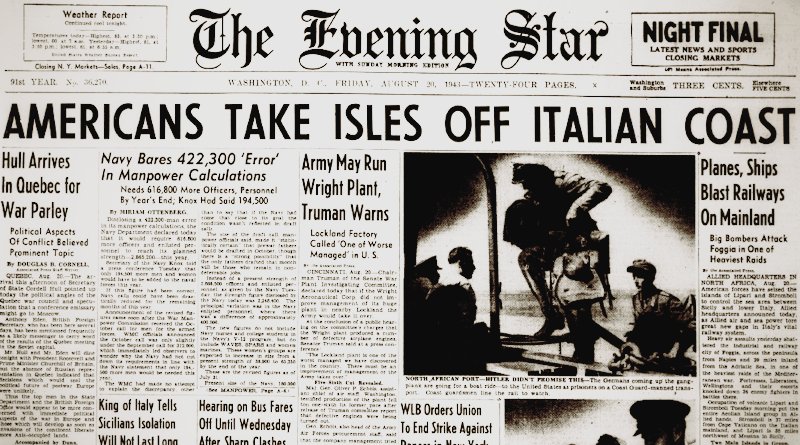World War II Chronicle: August 20, 1943
Click here for TODAY’S NEWSPAPER
Page five reports that two colonels have earned the Medal of Honor for this month’s raid on the Romanian oil fields at Ploesti. Col. Leon W. Johnson was one of the original four officers assigned to the Eighth Air Force in Savannah, Ga., but now commands the 44th Bomb Group. He had earned the Silver Star for leading a bombing raid in February 1943. Col. John R. “Killer” Kane is skipper of the 98th Bomb Group, and had already earned the Distinguished Flying Cross for leading a raid that sunk an enemy battleship and cruiser, plus a Silver Star for evading numerous attacks from an enemy fighter until the German pilot ran out of ammunition. German intelligence nicknamed him “Killer Kane” as a result of the 98th’s daring raids.

Johnson and Kane were part of elements that encountered storm clouds and became separated from the rest of the raid they ordered their flyers to continue to the target instead of aborting. In each case, another formation had already attacked their respective targets, spoiling the element of surprise. The enemy gun crews were alert and ready, but Johnson and Kane ordered their men to attack anyways. Stay tuned for more on Johnson and Kane…

George Fielding Eliot column on page six… Sports section begins on page 18. Yesterday the Phillies celebrated Danny Murtaugh Night, seeing their “peppery” second baseman off to the Army. Murtaugh goes to the Air Force, but finding him to be colorblind they send Murtaugh back. He will spend the war in the 97th Infantry, fighting in Europe. After the war he plays six more seasons before spending 15 years in the Pittsburgh dugout as the club’s skipper, winning two pennants and two World Series.

Roving Reporter by Ernie Pyle
SOMEWHERE IN SICILY – As all of you who have followed this column know, we have kept our pen pointed mainly at the common soldier – the well-known G.I. – for lo, these many months, and let the exalted high command shift for itself. But now for the next few days we are going to reverse things and write about an American general.
This is because he is pretty important but not very well known to the public, and because I thought you might feel a little better if you knew what kind of man was in direct charge of your boys who have been doing the fighting in Sicily.
The man I speak of is Lieut. Gen. Omar Nelson Bradley, who is the head of a corps of the United States Army.
General Bradley is what you might call third in the American command over here. General Eisenhower is at the top of everything. Lieut. Gen. George S. Patton, Jr., is the head man for our forces in Sicily. And Lieutenant General Bradley commands the corps which has been making the main effort.
General Bradley has been written about very little, and would continue to be written about very little if he had his way. He is innately modest and humble, and on top of that he knows that too much publicity can sometimes wreck a man’s career. But he also realizes that wen a soldier is in such a position as his he more or less becomes public property. So he has consented graciously to my doing this series about him.
I make no bones about the fact that I am a tremendous admirer of General Bradley. I don’t believe I have ever known a person to be so unanimously loved and respected by the men around and under him. In writing of him it would be easy to slip into embarrassing overpraise, so I will deliberately try to avoid that.
General Bradley came to Africa in mid-February and joined the front-line troops at Gafsa, in central Tunisia, during the bitter fighting at El Guettar. He was deputy corps commander then, under General Patton.
After El Guettar General Patton was called back to work on the preparations for the Sicilian invasion, and General Bradley was put in command of a corps for the final phase of our fight in northern Tunisia.
He handled that campaign so well that after it was over he was promoted to lieutenant general, given a Distinguished Service Medal, and decorated twice by the French. He has continued to command a corps through the Sicilian campaign, and again he has handled it with distinction. Nobody knows what lies ahead for him, but we who have seen him work cannot believe that his path leads anywhere but upward.
When General Bradley first showed up at Gafsa he hardly said a word for two weeks. He just worked around absorbing everything and getting acquainted, telling everybody to keep on doing his job just as he had been doing. In fact, he hasn’t said very much right up to this moment. Yet after a few weeks his influence began to be felt, and gradually, before anyone was hardly aware of it, he had this corps in the palm of his hand, and every man in it would now go to hell and back again for him.
One day a colonel stopped me under a tree and said this about the General:
“He has the greatness of simplicity and the simplicity of greatness.”
A second lieutenant friend of mine who has served with the Canadians and been twice decorated for bravery told me this:
“He is the finest officer, without exception, that I have ever served under.”
One night I was sitting with a bunch of enlisted men in the dusk and one of them said:
Are the correspondents awake to General Bradley? Do they know what a fine man he is?”
And now and then you’ll hear a correspondent remark something like this:
“Say, that Bradly is my man. I think he’s an old fox.”
They always say it as though they were startled and quite pleased by their own sagacity at suddenly having discovered it.
But General Bradley isn’t an old fox. If he has two outstanding traits they are simplicity and honesty. There is no pretense about him, either in method or in personality. He is just what he is, and that happens to be a plain Middle-Westerner with common sense and common honesty who has studied and practiced all his adult life for the job he is doing now. And he is doing it in just the same calm way he would play a game of bridge or drive a car to the station.
More about General Bradley tomorrow.
Evening star. (Washington, D.C.), 20 August 1943. Chronicling America: Historic American Newspapers. Lib. of Congress.
https://chroniclingamerica.loc.gov/lccn/sn83045462/1943-08-20/ed-1/
